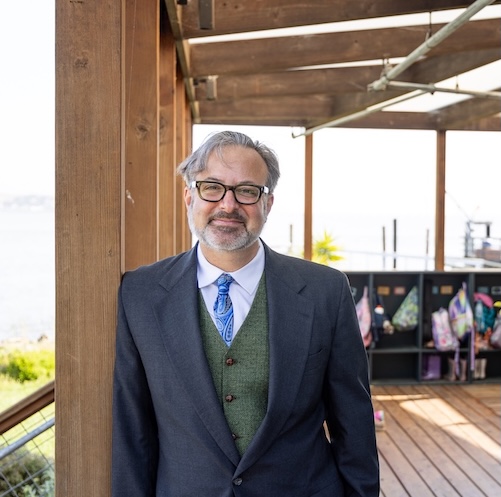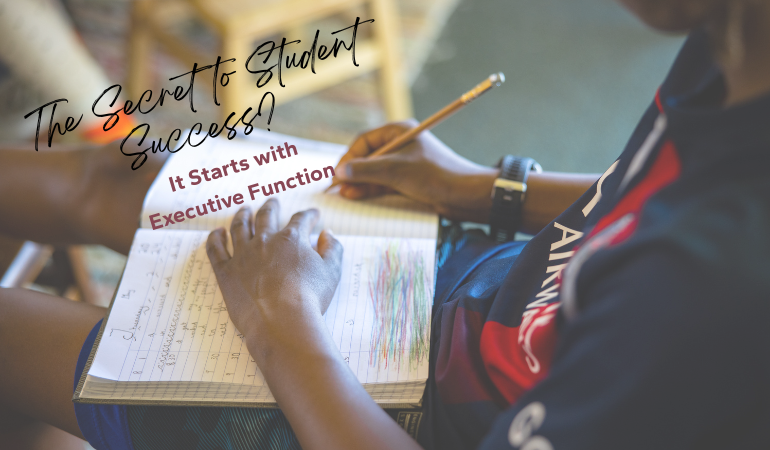I recently received a note from a current MMS parent whose daughter, now a high school sophomore, began her education with us in Primary and graduated from our Junior High and Full-Cycle/9th-grade program. She forwarded me an email from her daughter’s calculus tutor—her daughter is one of the few sophomores in a class otherwise composed of juniors and seniors. The tutor wrote:
“I have been extremely impressed with the results of your daughter’s Montessori education. Her executive functioning skills are the best I’ve seen in any student I’ve tutored in over five years. In particular, her ability to plan ahead and get work done is off the charts.”
(This tutor clicks the bona fides box, holding an undergraduate degree from the University of Pennsylvania and a PhD from UC Berkeley.)
It’s a meaningful affirmation—one of many we hear—about how deeply and durably our Marin Montessori education prepares students for the demands of learning and life. In the spirit of my article, Why Steve Jobs’ Motto Matters Even More Today, we at MMS remain endlessly curious about how best to educate our students for their futures—not our pasts. And it’s increasingly clear that one of the most valuable gifts we can give our children is strong executive functioning skills.
Executive function is a term for a constellation of mental processes that support planning, focusing, organizing, and managing one’s actions and emotions to meet goals. Harvard’s Center on the Developing Child refers to it as “the brain’s air traffic control system.” A recent Forbes article calls executive function “the secret ingredient to student success.”
Extensive research confirms what we observe every day: authentic Montessori education is particularly powerful in developing executive functioning. In fact, a widely cited study found that Montessori students engage in longer and deeper states of concentration than students in any other educational setting. Concentration and executive function—these are among the richest lifelong treasures we can offer our children. (To explore further research on the topic, see these four articles: one, two, three, four.
I’m reminded of an MMS alumna, a freshman studying biomedical engineering at Boston University. She shared with me how her early experiences with record-keeping and reflective conferences with her teachers helped her realize she’s a verbal processor. In her challenging STEM courses now, she’s the first in line at her professors’ office hours, eager to talk through the material out loud. She has become the pilot of her own learning, not a passive passenger.
The Power of the Metacognitive
Last week, during our annual Trustee Visiting Morning, one trustee shared her experience observing a one-on-one meeting between a teacher and an Elementary student. Though her own child had described these meetings, this was her first time seeing one in action. She left inspired. Together, we reflected on the remarkable benefits of having adult mentors who guide students as thoughtful, encouraging coaches, helping them reflect on their work, set goals, troubleshoot challenges, and take ownership of their learning.
These regular check-ins, in which Elementary students review their handwritten daily work journals, are profoundly metacognitive. (Every day, elementary students record all they work on each day, for how long, and what they accomplish.) The combination of work journals and one-on-one meetings with their teachers builds each student’s awareness of their learning patterns and needs—and as research shows, that kind of metacognitive awareness is a cornerstone of both resilience and academic self-direction.
Authorship and Group Success
One of the qualities that makes a Marin Montessori education truly distinct is that, from the Toddler years on, we honor and cultivate student agency. During the protected three-hour morning work periods in our Primary and Elementary programs, students have meaningful authorship over their work. Their time is not interrupted with bells over intercoms and sliced up into 45-minute chunks during which every child of the same biological age must do the same thing at the same time.
They build leadership and empathy alongside academic mastery.
Teachers, of course, are highly attuned to each student’s progress and guide them toward lessons and milestones to complete–and often go beyond–the curriculum. Within that framework, too, students are invited to go deep. Because they are engaged, have choices, and can go deep into their interests, they remain joyfully connected to learning and school.
As David Brooks wrote in his widely read piece, How the Ivy League Broke America:
“Success in school is about jumping through the hoops adults put in front of you; success in life can involve charting your own course. In school, a lot of success is individual: How do I stand out? In life, most success is team-based: How can we work together? Grades reveal who is persistent, self-disciplined, and compliant—but they don’t reveal much about emotional intelligence, relationship skills, passion, leadership ability, creativity, or courage.”
Our multi-age classrooms mirror the realities of the world beyond school, where success is so often about collaboration. At MMS, students are expected to support each other’s success. They build leadership and empathy alongside academic mastery.
Supporting Executive Function at Home
In addition to protecting children’s time from use or overuse of screens and supporting good sleep habits, here are three ways to bolster executive function development at home:
- Enlist your child in planning.
Seek every opportunity you can to get your child out of the metaphorical passenger seat and instead have them join you in piloting (to a point, of course). Ask them to help plan weekly meals and write shopping lists. Bring them to the store and let them retrieve items independently. Ask them to research and write out recipes to then cook together. Have them research and map out family vacations or family chore planning. Then, reflect together afterward, right after: How did it go? What would you change next time? This cycle of planning, acting, and reflecting is a goldmine for executive function growth. - Embrace time for less structured play with peers.
One key reason for the delay in executive function development compared with decades past is the steep decline in peer-directed play and peer group negotiations. When children negotiate game rules or solve problems together- including in class- without adult micromanagement, they engage their executive brain systems in powerful ways. If your children are Primary or Elementary age, I highly recommend our ASC after school program, for it mirrors the archetype of the 1950s band of kids playing in the cul-de-sac after school feel. Children self-organize activities together (e.g., chess, baking, board and card games, monkey bar sessions, sports outside, etc.), all with gentle yet highly aware adult presence and coaching when needed. - Let them struggle.
Neuroscience reveals that when parents and teachers interrupt a child’s struggle to achieve a goal, we deprive them of creating vital synaptic connections in their brains. Remember that our goal is to support their healthy, robust brain development. No matter how intense the itch is to show them how to complete the puzzle, tie the shoe, make the grilled cheese, or complete the science project, we need to sit on our hands and resist. The short-term emotional relief we will feel is not worth the deprivation of their neurological development and confidence in their own capacities. Of course, this is relative: We want our kids to have healthy struggles but not get physically hurt or traumatized, and they need scaffolding lessons for all things in life (e.g., “This is how you tie a shoe…” “…This is how you make a grilled cheese sandwich…”).
From the Frontlines: Still Letting Them Struggle
Executive functioning is not “complete” when our children head off to college. In fact, many neuroscientists now view the adolescent period as extending through the early twenties.
A personal example: When we dropped one of our sons off for his college orientation, we gently reminded him the night before, “Make sure you’ve read the orientation email—especially the packing list.” He gave us a confident thumbs-up. But when we arrived, we noticed that every other freshman seemed to have brought a sleeping bag. Our son had not. His face paled.
Did we rush to Target to buy him a sleeping bag? We did not. One night of being uncomfortable isn’t a tragedy—but it is a lesson. He had to figure out how to solve his problem—maybe by asking an RA for a spare blanket.
Though our parental instincts could barely stand to imagine him uncomfortable, we knew the discomfort would grow his awareness, responsibility, and resilience, which would be vital in the long game of his life–let alone necessary for completing and graduating from college.
Now in his sophomore year, he lives independently, runs his own online business, manages academics, and leads a full social life. His days are filled with choices, mistakes, successes—and growth. Just as we aim to do at MMS, college is keeping him in his zone of proximal development: challenged to the right edge, engaged, and thriving.

As Head of School, Sam is responsible for ensuring that Marin Montessori flourishes and that the School’s mission is brought to life each and every day.





